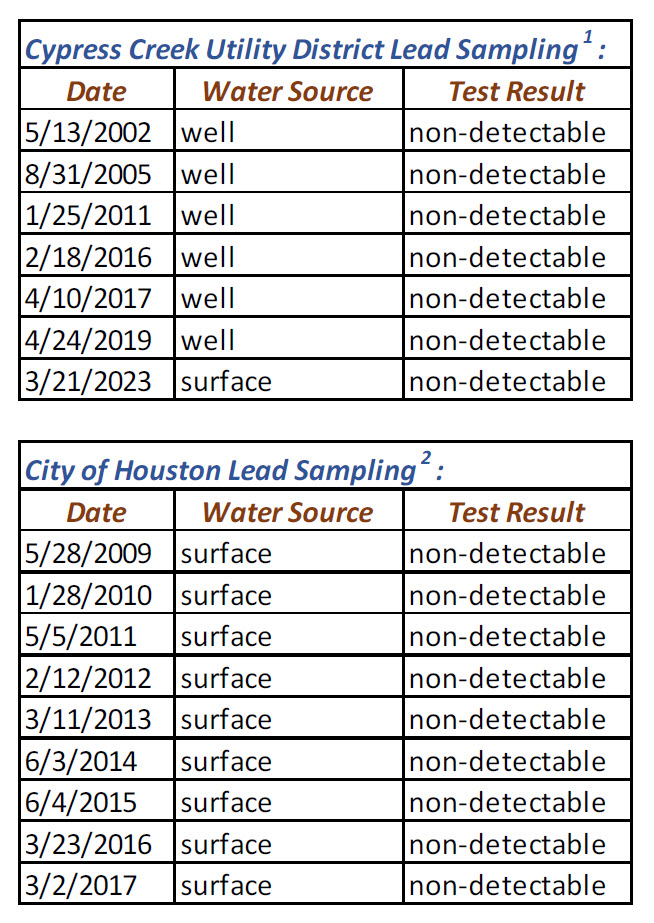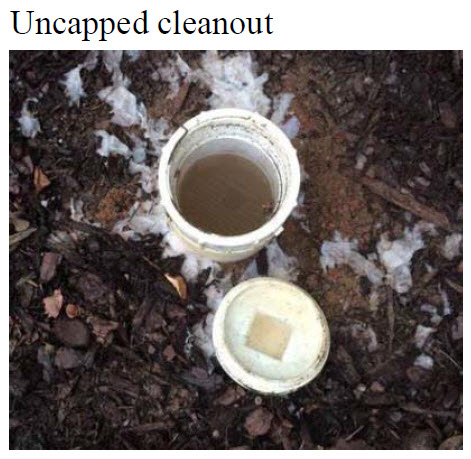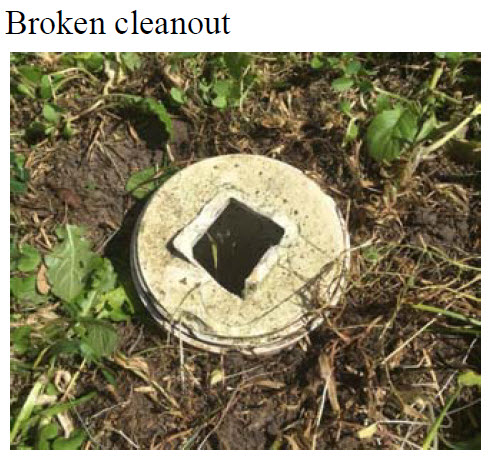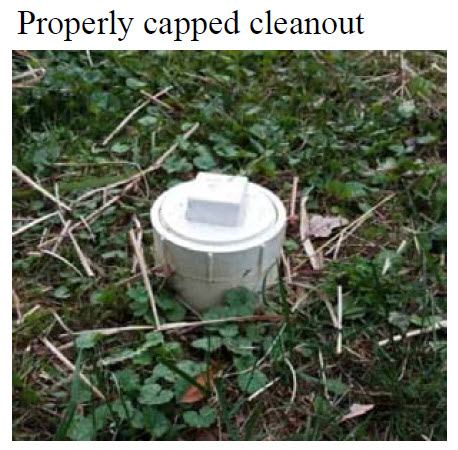June 15, 2023, Update on Excess Lead Levels in CCUD Water Samples
Previously this year in January, a public education notice was distributed as an insert in the water/sewer bills of Cypress Creek Utility District (CCUD). The notice was provided because 3 samples collected in the 4th quarter of 2022 from the homes of 20 residents who voluntarily participate in the District’s in‐home water sampling program exhibited lead levels in excess of the regulated action level.
The notice provided good information about lead exposure from various sources as well as steps one can take to reduce exposure to lead in drinking water. A link to the same notice is provided below.
Additional information is now being provided to explain (1) the sources of the lead, (2) the future testing for lead, and (3) the remedial actions to correct the problem.
Confirming that the Public Water Supply is Lead‐Free
Fact #1: It is important to know that CCUD has no lead pipes in its distribution system which include both the main lines and the service lines from the mains to the meters. Thus, it can be said that the lead found in those 3 samples collected in the 4th quarter of 2022 did not originate from lead pipes owned by CCUD.
Fact #2: It is also important to know that lead testing done by the Texas Commission on Environmental Quality (TCEQ) on CCUD’s and City of Houston’s (COH) public water supply has not detected any level of lead in the public water supply being provided to the homes and businesses within CCUD. These test results are archived on the TCEQ website for all to see.
Below is a summary of this CCUD and COH testing of the public water supply.

1 TCEQ mandated tests at CCUD water plant point of entry.
2 TCEQ mandated tests at point of entry between COH and NHCRWA.
Fact #3: The absence of elevated lead in 17 of the 20 water samples drawn from homes in the District offer a final confirmation that the lead is not originating in the public water supply because if the public water supply were contaminated with lead then all the home samples would be expected to show elevated lead levels. When considered cumulatively, the above 3 facts support the view that the source of the elevated lead in the home samples drawn in the 4th quarter of 2022 is not the public water supply.
Likely Sources of Lead Inside District Homes
The lead that was found in those 3 samples taken in our District, in all likelihood, originated from one or both of 2 common sources of lead in drinking water inside homes. One source of lead is brass faucets or valves containing up to 8% lead content that were commercially available between the 1970’s and 2014. Another source of lead is the lead solder that was commonly used in copper piping connections prior to 1986.
The reason that elevated lead levels have just recently showed up in the District’s in‐home sampling is likely due to the conversion of the District’s water supply from ground (well) water to surface water, as was mandated in accordance with legal requirements.
The ground water that the District used prior to June 2022 was “hard” water that contained high mineral content. When hard water is used over time, layers of mineral deposits build up that coat the brass and/or the solder, and, generally, this buildup helps prevent or minimize lead from leaching into the water. When the District switched to “soft” surface water which has considerably less mineral content, the mineral buildup coating the brass and/or solder was compromised, resulting in lead leaching into the water.
Actions Taken by District to Remediate the Problem
To remediate this problem of lead leaching, the District is adding safe phosphates to the water supply which have been found to control the problem of lead leaching in many cases. The District will carefully monitor the outcome of this remediation effort through its ongoing water sampling program and will continue to report the results to all residents and businesses.
Because of the 3 samples from District homes that had levels of lead above the action level, TCEQ is requiring CCUD to complete 2 rounds of home testing for lead in 2023, as well as other tests and reports. The District is currently engaged in the 1st round of testing that has a scheduled completion date of June 30, 2023. After the samples have been analyzed at an approved lab, the results will be published on the TCEQ website. At that time, the District will also publish the results in an update on the CCUD website as soon as this information is officially available, most likely in July or August.
The second round of testing will be completed by December 31, 2023, with the results being published in early 2024. Going forward, the District will continue to take actions to remediate and test for lead levels as required. The District will continue to provide information and public educational notices to residents.
Actions Residents Can Take to Reduce Exposure to Lead in Drinking Water
- Get home drinking water tested. Residents have the option to pay $60.00 for a lead exceedance test of their drinking water by calling the District’s billing office at (281) 469‐2837 to request testing. The District will drop off a collection bottle at the residence and pick it up the following day after the resident has collected the water sample. The District will forward the sample to the TCEQ‐approved lab for analysis. The $60.00 cost will be included as a charge on the resident’s next water bill.
- Run water to flush out lead. If a cold water tap has not been used for 8 hours or more, running the water for 2 minutes should flush any lead‐containing water from the pipes and fixtures. For each hour less that the tap has not been used, reducing the 2 minutes in 15 second increments should flush out any lead. To conserve water, remember to catch the flushed tap water for plants or some household use such as cleaning.
- Use cold water for cooking and preparing baby formula. Do not cook with or drink water from the hot water tap since lead dissolves (or leaches) into hot water more easily. Do not use water from the hot water tap to mix baby formula.
- Do not boil water to remove lead. Boiling water will not reduce or remove lead.
- Look for alternative sources or treatment of water. Using bottled water or a water filtration system can be considered as options. If choosing a filtration system, read the package to be sure that the filter is approved to reduce lead and be sure to maintain and replace the filter in accordance with the manufacturer’s instructions to protect water quality. Contact NSF International at (800) NSF‐8010 or https://www.nsf.org/consumer-resources/articles/lead-drinking-water for information on performance standards for water filters.
- Consider re‐piping home and/or replacing brass faucets and valves. Re‐piping the interior water lines in the home can be considered if the home contains copper piping with pre‐1986 lead solder. Replacing pre‐2014 brass faucets and valves that may have a lead content up to 8 percent can be considered as an option to reduce or eliminate lead leaching into the drinking water.
- Get child’s blood tested. Contact the local health department or a healthcare provider to have a child tested for lead if concern exists for lead exposure.
Links to Information on CCUD Website
Please check the District’s website, https://www.cycreekud.com/, for future updates concerning the District’s ongoing water sampling and link to the following documents archived on the website.
- CCUD Lead Exceedance Public Education Notice, 1/19/2023
- CCUD 2022 Annual Drinking Water Quality Report
Robert Camp, President
Cypress Creek Utility District




